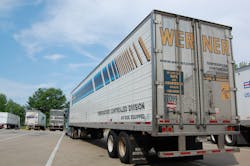While many industry experts remain hopeful that modest growth in freight volumes will occur during the balance of 2012, others are expressing concern over a variety of issues could weaken demand – especially as many broader business surveys indicate sluggish economic growth is here to stay for the foreseeable future.
“I’d characterize it as a kind of ‘uneasiness’ in the freight market right now,” Eric Starks, president of research company FTR Associates, told Fleet Owner in regards to the overall feeling expressed during the firm’s annual Transportation Conference held in Indianapolis last month.
“In terms of freight things were sluggish to flat over the summer with some positive ‘spottiness’ in September, but not enough to call it a trend,” Starks said. “Everyone is very cautious about the direction the U.S. and global economy are heading in. While there’s still underlying optimism that we won’t enter a recession next year, there’s a lot of what I’d call sobering data to consider – a lot of potentially difficult ‘what ifs’ in terms of demand-side risk.”
John Larkin, a transportation analyst with Stifel Nicolas, noted that his key takeaways from FTR’s annual conference included: the U.S. slow recovery will continue, with current growth barely able to absorb new entrants into the workforce; Manufacturing has recovered about 78% of what it lost during the recession, but has stalled over the past 3 months; and the current recovery has averaged less than half of the growth rate of previous recoveries.
Where the truckload market is concerned, Larkin’s takeaways were a little brighter, with rate increases expected to average close to 3% per annum for the current decade, with annual variability.
However, he also discerned that industry experts and participants attending the conference do not expect trucking exceed its previous volume peak until the end of the current decade, with no regulatory relief expected to be forthcoming with respect to the new CSA [Compliance Safety Accountability] program, EOBRs [electronic onboard recorders], and hours-of-service reform.
Broader surveys also indicate a level of uncertainty and uneasiness in terms of U.S. economic prospects.
For example, according to the latest U.S. Investment Manager Outlook (IMO), a quarterly survey of nearly 200 U.S. senior-level executives at equity investment and fixed-income management firms conducted by Russell Investments, 73% of those polled indicated that they expect U.S. real gross domestic product (GDP) growth to fall between 1.5% to 2% in the next year; a far less optimistic view than seen in the June 2012 IMO report, when 58% expected GDP growth to stay around 2.5%.
“Like many managers, we recently downgraded our U.S. GDP growth outlook as we felt the projected pace of growth was not enough to make meaningful inroads for the economy and unemployment rate,” said Rachel Carroll, consulting client executive at Russell. “The markets don’t like uncertainty and managers are still looking for clarity on many issues, from the Euro zone to the U.S. presidential election and the U.S. fiscal cliff.”
The firm added that nearly half of the managers it surveyed (48%) expect developments in the Euro zone to have a negative impact on the markets over the next year – pointing to the anticipation of minimal progress toward meaningful resolution.
Many of those polled pointed to the outcome of the U.S. presidential election (30%) and the outcome of the U.S. “fiscal cliff” situation (28%) as the events could create the greatest positive impact on the U.S. markets in 2013.
However, many managers (37%) also characterized the so-called “fiscal cliff” − the expiration of certain U.S. tax cuts and the imposition of automatic spending reductions at the end of 2012 − as an event with an expected negative impact, adding that developments in China’s economic situation (cited by 18% of those surveyed) to have a negative effect on markets as well.
Freight carriers aren’t very sanguine either concerning their forecast for the future. Werner Enterprises, for one, mentioned late last month that it expects its third quarter earnings to only be in the 33 cent to 36 cent range per diluted share due to a variety of negative factors.
“Significant factors that are affecting earnings per share in third quarter 2012 compared to third quarter 2011 include: cost increases for truck and trailer depreciation and driver pay; rising fuel prices; increased equipment maintenance costs; and higher health care costs,” the carrier said. “These costs are increasing faster than our revenue per mile.”
About the Author
Sean Kilcarr
Editor in Chief
Sean Kilcarr is a former longtime FleetOwner senior editor who wrote for the publication from 2000 to 2018. He served as editor-in-chief from 2017 to 2018.
